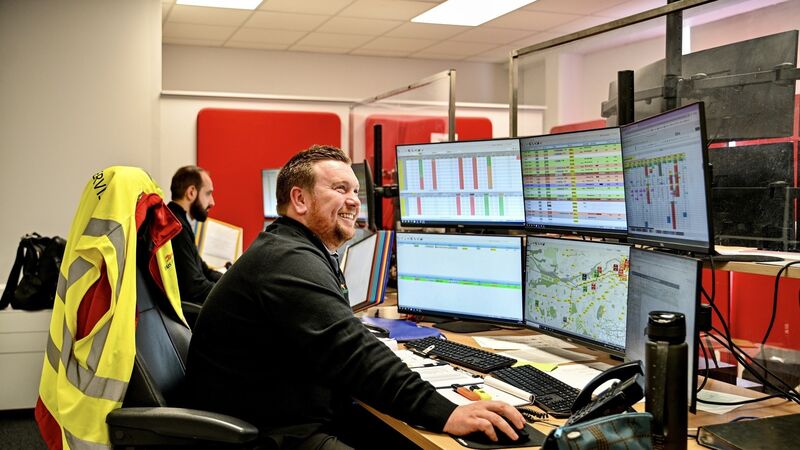Delays frustrating for passengers, frustrating for drivers

Controllers Dave O’Sullivan and Gennero Capasso working in the complex and demanding control room in Capwell bus depot, Cork city. Picture Chani Anderson
The lack of bus priority lanes in Cork city forces bus drivers to merge with cars in lines of traffic, which adds time to each route.
I jumped on the 206 bus outside Capwell Bus Depot at approximately 2.30pm alongside Mr Williams and Bus Éireann media and communications manager Colin Heeney to get a feel for both bus driver and commuters experiences along the route.
The 206 route serves South Mall to Grange through Douglas.
The bus was already 19 minutes late by the time we got on the bus due to excess traffic.
Schools along the route were closing and parents were picking up their children while parked in the bus corridor by the bus stop, which added more time to the journey.
Running a bus service in a busy city cannot be easy. Equally, relying on public transport to get to work on time, make the important meeting, or be on time for hurling training, can be a stressful time as you know the bus you are hoping to catch may not show up and causes you to be late.
I have lost count of the number of times I left my house to walk to a bus stop to catch a bus that is scheduled to arrive in 10 minutes, only to see the route has been cancelled randomly and you must wait at least 20 minutes for the next service.
This is very frustrating as it could derail your entire day and force you to cancel appointments.
My time at Capwell taught me that although the bus journey was randomly cancelled for me, and I had to wait for the next one, the decision was not taken lightly and someone made the decision to keep the city ticking over.
Should we as commuters receive the information earlier to allow for other arrangements to be made? Absolutely.
At the same time, decisions have to be made instantly in certain situations, so that has to be taken into consideration when we look at the electric sign at the bus stop or we log onto the TFI app to see that the service is cancelled.
It is important to remember that people using public transport keep fewer cars on the road at any given time, and the cancellation of buses will lead to more people driving their car on a road that also has a bus route.
Many commuters, including myself, are interested to see how the BusConnects plans for the existing bus routes will contribute to the effectiveness of public transport in Cork.
Of course, the buses will not be driven on paper and having extensive plans are great, but how will they work in real time?
Coming from a rural town in east Galway, the idea of a functional public transport service is unheard of. I bought my first Leapcard while in college in Limerick and the services Bus Éireann offers across the country are extremely handy but are only as great as their punctuality.
Your best ability is your availability. This is the same for public transport. The promises the NTA and the Department of Transport have made are only as good as their chance of coming to fruition.
Many people spoke to me about their frustration with the services either not showing up or randomly cancelling, which led to people missing important hospital appointments or other activities.
Will these issues disappear when the 50% increase in services that BusConnects proposals cites?
Who knows? We will have to wait and see.





